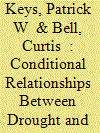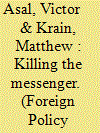|
|
|
Sort Order |
|
|
|
Items / Page
|
|
|
|
|
|
|
| Srl | Item |
| 1 |
ID:
158844


|
|
|
|
|
| Summary/Abstract |
Much of the literature on climate change adaptation claims the destabilizing consequences of environmental crises are mitigated by sociopolitical conditions that influence a state's susceptibility to scarcity-induced violence. However, few cross-national studies provide evidence of conditional scarcity-conflict relationships. This analysis of drought severity and civil conflict onset in sub-Saharan Africa (1962–2006) uncovers three sociopolitical conditions that influence the link between environmental scarcity and civil conflict: social vulnerability, state capacity, and unequal distribution of resources. Surprisingly, we find drought does not exacerbate the high risk of conflict in the vulnerable, incapable, and unequal states thought to be especially susceptible to increased scarcity. Instead, drought negates the peace-favoring attributes of stable states with less vulnerable populations. During severe drought, states with sociopolitical conditions that would otherwise favor peace are no less likely to suffer conflict than states with sociopolitical conditions that would otherwise increase the risk of violence. These findings, which are robust across several measures of these sociopolitical concepts, suggest environmental scarcity is most likely to increase the risk of conflict where populations have more to lose relative to periods with more favorable weather.
|
|
|
|
|
|
|
|
|
|
|
|
|
|
|
|
| 2 |
ID:
158847


|
|
|
|
|
| Summary/Abstract |
What are the domestic determinants of international conflict? I employ elements of salience theory to build an issue emphasis approach to foreign policy. I argue that parties and candidates in democracies credibly signal their foreign policy position prior to their election and that leaders live up to their foreign policy position. Significant research explains how both the behavior of other states and domestic political institutions may constrain leaders, so there are reasons to doubt leaders may be able to match deeds with words. Some scholars have integrated measurements of partisanship into their theoretical explanations, but extant scholarship has not effectively introduced the foreign policy position of the executive into the equation. Using this approach, we can connect competing foreign policy platforms to conflict behavior in a new way. I estimate initiation of militarized interstate disputes by democracies from 1951–2000 in the empirical test, and the results provide support for the hypothesis.
|
|
|
|
|
|
|
|
|
|
|
|
|
|
|
|
| 3 |
ID:
158846


|
|
|
|
|
| Summary/Abstract |
Does trade reduce conflict even when states compete over high-salience issues (e.g., territory)? Despite recent challenges to liberal peace theory, few studies have examined whether the trade-reduces-conflict argument is robust to particularly conflict prone issues like territory. We evaluate whether trade reduces not only violent conflict over territory, but also the incentives to use specific power politics behaviors (e.g., arms races) associated both with territorial competition and a higher probability of war. As key causal mechanisms, we rely on opportunity costs and the ability to credibly signal information that increased trade generates, reducing states’ incentives to engage in violent conflict and arms races. Empirical analyses, using multiple sample populations and different measures of key indicators and outcomes, are consistent with our expectations. The results suggest that trade may reduce conflict both directly, by decreasing the likelihood of militarized disputes, and indirectly, by reducing the likelihood of power politics strategies like arms races, thought to increase the likelihood of war.
|
|
|
|
|
|
|
|
|
|
|
|
|
|
|
|
| 4 |
ID:
158848


|
|
|
|
|
| Summary/Abstract |
According to conventional wisdom, strategic natural resources like oil are harmful to international peace. Nonetheless, there is little comparative work on the link between resources and interstate conflicts. Analyzing the impact of oil on militarized interstate disputes on the dyadic level of analysis for the period from 1946 to 2001, this paper shows that oil in fact influences the conflict potential between countries. Results of logistic regressions suggest that absolute oil abundance as well as oil dependence increase the risk of dispute involvement. We find that in particular oil production, oil reserves, oil dependence, and oil exports are associated with a higher risk of initiating conflict while countries enjoying large oil reserves are more frequently the target of military actions. Furthermore, our analysis indicates that the presence of large oil deposits also increase the intensity of international disputes. Relative measures of oil abundance such as per capita oil production, in contrast, do not affect countries’ dispute proneness. Increased militarization, the internationalization of intrastate violence, the indulgence of an oil-dependent world community and so-called “classical resource wars”—rather than domestic political mechanisms inherent to the rentier state—are likely to explain our findings.
|
|
|
|
|
|
|
|
|
|
|
|
|
|
|
|
| 5 |
ID:
158850


|
|
|
|
|
| Summary/Abstract |
The question of international cooperation on nuclear security presents states with a conundrum. While states are wary of the potential for cheating and opportunism that would favor more legalized agreements, highly legalized agreements also create the risk of being constrained in an agreement with which others might not comply, leaving one state vulnerable. How do states balance these competing incentives? Through the study of all arms control agreements concluded, negotiated, and seriously considered since 1945, this analysis finds that at least some aspects of the legalization parameters that would make commitments more credible and sustainable through the future—in particular obligation and to a lesser extent delegation—also make bargaining over the terms of cooperation more difficult, sometimes delaying if not altogether subverting that process. These findings have implications not just for how theories of institutional design and cooperation apply to nuclear issues but also for policies related to the conduct of arms control negotiations.
|
|
|
|
|
|
|
|
|
|
|
|
|
|
|
|
| 6 |
ID:
158845


|
|
|
|
|
| Summary/Abstract |
What countries are most dangerous for journalists? Both conventional wisdom and extant literature on political violence, democracy, and reporter fatalities suggest that more democratic systems should make journalists safer. However, we argue that a more democratic context makes it easier for journalists to pursue stories that put them at risk and that they are thus more likely to be killed by actors trying to avoid the spotlight and exposure. Conversely, autocratic regimes provide fewer opportunities to pursue dangerous leads, thereby reducing the chance of being killed. Using novel cross-national data on the number of journalist killings between 1992 and 2008, we find that these arguments are generally supported when controlling for other factors that affect the killing of journalists, such as poor governance and political conflict.
|
|
|
|
|
|
|
|
|
|
|
|
|
|
|
|
| 7 |
ID:
158849


|
|
|
|
|
| Summary/Abstract |
Why do states shift from opposition to torture to its employment in the face of widespread abhorrence and claims that it generates unreliable information? The expected value of acting upon unreliable information depends on the state’s appraisal of the type of error it might be committing. States may value avoiding Type I errors, which result from acting upon incorrect intelligence, differently than avoiding Type II errors, which result from failing to act on an undetected threat. Interrogations yield a mix of truth and lies; operations employing this information will avoid making Type II errors but will also make Type I errors. A state’s preference over error type changes with circumstances (as we show, occurs in Turkey and the United States), leading states to adopt coercive interrogation techniques despite secular abhorrence of torture. Our results suggest anti-torture advocacy might be more effective targeting preferences over error types than reinforcing anti-torture moral imperatives.
|
|
|
|
|
|
|
|
|
|
|
|
|
|
|
|
|
|
|
|
|